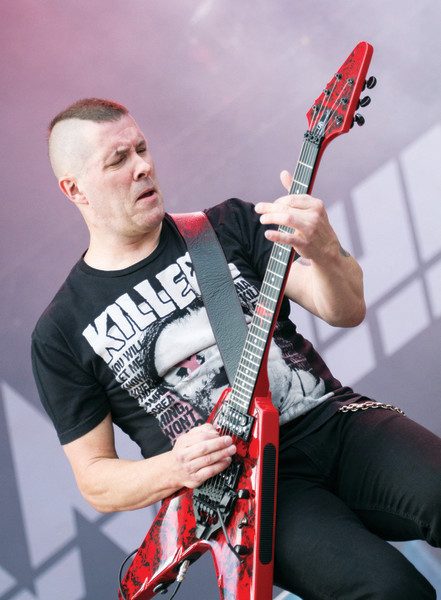Eight Questions with Annihilator Guitarist Jeff Waters

Annihilator Guitarist Jeff Waters recently sat down for the "eight questions" treatment. It went a little something like this.
What influenced you to pick up a guitar?
My mother told me we would walk by this shopping mall where we lived in Ontario, Canada, and there was a guy playing guitar all the time out in the street. I sorta had little temper tantrums when I wanted to stop and listen and she would pull me away. So she picked up really quickly that, out of the piano, which she played, and other instruments, nothing sort of got my attention [like the guitar]. I was a real ADHD kid. It just seemed like guitar was something I could focus on. I was a zombie, staring right at it. So she got me into lessons when I was probably seven, eight, nine years old.
What was your first guitar that you owned?
The first decent guitar I got was a Yamaha classical from 1974, which I used on the song “Crystal Ann” on my band’s first album. I still have it in my studio today. I guess my first electric was from Sears. My mom got me this totally cheap Les Paul copy. I’d gotten into Van Halen and started striping my guitar right away!
What was the first song you learned?
It was called “Big Rock Candy Mountain,” a two-chord, simple song. I remember Elton John’s “Saturday Night’s Alright for Fighting”—tryin’ to figure out those notes.
Get The Pick Newsletter
All the latest guitar news, interviews, lessons, reviews, deals and more, direct to your inbox!
What do you recall about your first time playing live?
It was in our high school auditorium. But of course I got caught the day before in rehearsals smokin’ weed with one of the other guys, so they kicked us off and we never got to play the show. The next one was at another high school. I think we were doing “Black Magic” by Slayer. We did a Venom song. I think we even did an Anvil song.
Have you ever had an embarrassing moment onstage or a nightmare gig?
We were looking forward to playing the Alcatraz Festival in Belgium. We went onstage and I was trying to sing along and find the pitch of the song, but my guitar was locked into the wrong tuning, a half-step out from everybody else. My tech obviously didn’t calibrate the tuners right and just tuned them all wrong. Normally, I would never do anything like this, but I got so frustrated and was so adrenalized, going onstage and the crowd was into it. I got extremely angry, and didn’t think. I grabbed one of these Boss tuning pedals and threw it at the backdrop. All the crowd and the stage crew saw was Waters throwing a tuner and figured I was throwing it at someone. And I stormed off the stage like a little diva and just left, didn’t say anything to the crowd and just bailed. That was the most regrettable moment of my career for live stuff.
Is there a particular moment on Annihilator’s new album, For the Demented, that makes you proud as a guitar player?
“Twisted Lobotomy” is more of an older-school Annihilator vibe from our early demo days, back in the mid Eighties. It’s real raw and thrashy, I’m not trying to play fancy or anything. “For the Demented” is a swingin’, groovin’ tune with a Van Halen-y vibe in the solo. Sometimes I like playing fast, sometimes I like playing bluesy, sometimes tasteful. Whatever the song calls for.
What is your favorite guitar or piece of gear?
I’ve got a mini collection of Van Halen guitars. I’ve got a couple of top ones—a Frankenstrat and a Gibson SG Diablo. Those would be the two favorites of mine. Then the real-world ones I use in the studio, I’ve got two models of Epiphone guitars. I like the lower-cost guitars, they just seem to have a twang and some life and bounce to them. And there’s a Wolfgang USA charcoal black guitar that I got a few years back from Van Halen’s guy, and one of the Epiphone Annihilation guitars I have. And another store-bought Van Halen guitar, one of the black/white striped thingies that I use for almost all of my solos now. It’s amazing.
Do you have any advice for young players?
I’d probably say the same thing to somebody who’s trying to do this long term or as a hobby. You’ve just gotta have fun with it. And it would be really cool to learn different styles if you’re trying to do it as a serious living. This is the toughest time in the last 20–30 years to have an actual career—and to last. You have to learn everything you can about not only your instrument, but other instruments, and how to write. Even if you’re not great at everything, you’ve gotta multitask. Learn how to record stuff at home. If your bass player doesn’t show up, grab a bass and learn how to play it. And you’ve got to keep your brain clear. You can’t do that if you’re partying all the time.
“His songs are timeless, you can’t tell if they were written in the 1400s or now”: Michael Hurley, guitarist and singer/songwriter known as the ‘Godfather of freak folk,’ dies at 83
“The future is pretty bright”: Norman's Rare Guitars has unearthed another future blues great – and the 15-year-old guitar star has already jammed with Michael Lemmo









